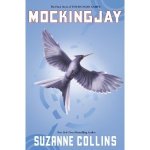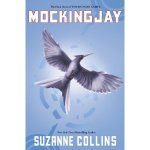 Suzanne Collins, Mockingjay (New York: Scholastic, 2010). $17.99, 400 pages.
Suzanne Collins, Mockingjay (New York: Scholastic, 2010). $17.99, 400 pages.
The Hunger Games trilogy by Suzanne Collins comes to a bloody end with Mockingjay, the series’ final volumes. (I reviewed the first two volumes here and here.)
The story takes place in North America, sometime in the future. A civil war between the Capitol and its thirteen districts resulted in the annihilation of District 13 and the imposition of the Hunger Games on the remaining twelve. For seventy-five years, each district has sent one girl and one boy between the ages of 12 and 18 to kill or be killed in the arena.
In The Hunger Games, Katniss Everdeen and Peeta Mallark represent District 12. At the end of that year’s game, Katniss and Peeta are the final contestants. Instead of killing one another, however, they deliver a choice to the Capitol: either both live or both kill themselves.
Catching Fire picks up where The Hunger Games ends. The Capitol lets Katniss and Peeta live. Knowing, however, that Katniss (especially) is a threat to the Capitol’s political interests, they inaugurate a new hunger game, where previous victors fight one another. At the end of the book, a rebellion breaks out, with Katniss being rescued by forces from the long-thought-annihilated District 13 and Peeta being held captive and tortured by the Capitol.
Mockingjay begins several weeks after the end of Catching Fire. Katniss is recovering from her wounds, when District 13’s leader, President Coin, recruits her to serve as the face of the rebellion against the Capitol. The rebellion rescues Peeta, who has been tortured and brainwashed, but in the process of the fight, Katniss learns that neither President Coin nor District 13 are on the side of the angels.
Mockingjay is a very dark and violent book, especially to be produced by Scholastic for the “young adult” market, i.e., teenagers. It doesn’t glamorize war. Indeed, it verges on moral equivalence. But it does raise profound questions about nationalism, war, terrorism, and moral choice.
My primary criterion for good fiction is whether I can put it down once I’ve started to read it. Starting with The Hunger Games, I couldn’t put this book down, and I could barely wait for the next book of the series to be published. Now that the series is over, I’m looking forward to Suzanne Collins’s next series.
—–
P.S. If you found this review helpful, please vote “Yes” on my Amazon.com review page.

